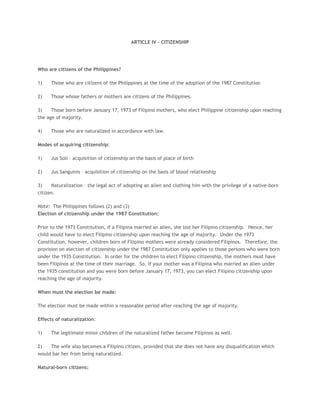
Article IV Citizenship
- 1. ARTICLE IV – CITIZENSHIP Who are citizens of the Philippines? 1) Those who are citizens of the Philippines at the time of the adoption of the 1987 Constitution 2) Those whose fathers or mothers are citizens of the Philippines. 3) Those born before January 17, 1973 of Filipino mothers, who elect Philippine citizenship upon reaching the age of majority. 4) Those who are naturalized in accordance with law. Modes of acquiring citizenship: 1) Jus Soli – acquisition of citizenship on the basis of place of birth 2) Jus Sanguinis – acquisition of citizenship on the basis of blood relationship 3) Naturalization – the legal act of adopting an alien and clothing him with the privilege of a native-born citizen. Note: The Philippines follows (2) and (3) Election of citizenship under the 1987 Constitution: Prior to the 1973 Constitution, if a Filipina married an alien, she lost her Filipino citizenship. Hence, her child would have to elect Filipino citizenship upon reaching the age of majority. Under the 1973 Constitution, however, children born of Filipino mothers were already considered Filipinos. Therefore, the provision on election of citizenship under the 1987 Constitution only applies to those persons who were born under the 1935 Constitution. In order for the children to elect Filipino citizenship, the mothers must have been Filipinos at the time of their marriage. So, if your mother was a Filipina who married an alien under the 1935 constitution and you were born before January 17, 1973, you can elect Filipino citizenship upon reaching the age of majority. When must the election be made: The election must be made within a reasonable period after reaching the age of majority. Effects of naturalization: 1) The legitimate minor children of the naturalized father become Filipinos as well. 2) The wife also becomes a Filipino citizen, provided that she does not have any disqualification which would bar her from being naturalized. Natural-born citizens:
- 2. 1) Citizens of the Philippines from birth who do not need to perform any act to acquire or perfect their Philippine citizenship. 2) Those who elect Philippine citizenship under Art. IV, Sec. 1(3) of 1987 Constitution. Marriage of Filipino with an alien: 1) General Rule: The Filipino RETAINS Philippine citizenship 2) Exception: If, by their act or omission they are deemed, under the law, to have renounced it. Examples of renunciation of Philippine citizenship: 1) Voluntarily obtaining foreign passport 2) Pledging allegiance to another country (ex. by becoming a naturalized citizen of another country) Re-acquisition of citizenship Natural-born Filipinos who are deemed to have lost their citizenship may re-acquire the same via repatriation proceedings. This involves taking an oath of allegiance and filing the same with the civil registry. How may one lose citizenship: 1. By naturalization in a foreign country 2. By express renunciation of citizenship 3. By subscribing oath or allegiance to a foreign Constitution 4. By serving in the armed forces of an enemy country 5. By being a deserter of the armed forces of one’s country How may one reacquire citizenship: 1. By direct act of Congress 2. By naturalization 3. By repatriation Reference: Political Law (Constitutional Law) Reviewer & Memory Aid Ateneo Central Bar Operations 2001 Louie, Carrie, Evelyn, Thel, Gem, Ronald
